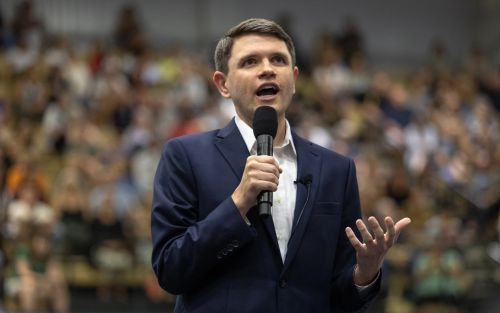

Progressive Christianity is emerging as a significant force at a moment when Christian nationalism is reshaping parts of American religious and political life.

By Matthew A. McIntosh
Public Historian
Brewminate
Introduction: A Different Christian Voice Emerges
A growing number of Christians across the United States are rejecting the hardline politics of MAGA-aligned evangelicalism and embracing a very different vision of their faith. Progressive Christian communities are becoming increasingly vocal in countering Christian nationalist messages, arguing that the teachings of Jesus stand in direct conflict with authoritarian politics and exclusionary rhetoric. What was once a quieter current within American Christianity is now emerging as an organized movement determined to reclaim the moral and ethical framework of the tradition.
Writers and organizations within this movement describe the shift as both necessary and overdue. It is fueled by believers who refuse to let Christianity be defined by bigotry, political extremism, or allegiance to Trump. Commentary from John Pavlovitz underscores this tension, emphasizing that MAGA ideology is incompatible with the compassion and justice central to Jesus’ message. As more Americans distance themselves from fundamentalism, progressive Christians are stepping forward to offer an alternative that aligns faith with dignity, empathy, and social responsibility.
This is not a new tradition but a revived one, with deep roots in figures like Jimmy Carter, a model of progressive evangelical faith shaped by humility, service, and human rights. Today’s movement draws on that lineage to challenge Christian nationalism’s distortions and to provide a home for believers disillusioned by the fusion of religion with political identity. As these voices gain prominence, they are reshaping the landscape of American Christianity and offering a counterweight to the extremism that has taken hold in parts of the evangelical world.
The Rise of Progressive Christianity in Public Life
Progressive Christianity has moved from the margins of public conversation to a visible and organized counterweight to Christian nationalism. Progressive Christian groups are intentionally amplifying messages centered on inclusion, compassion, and social justice, and they are doing so in direct response to the political influence of the MAGA-aligned religious right. These communities are using sermons, public statements, and advocacy networks to draw a clear moral distinction between their understanding of Christian ethics and the exclusionary, authoritarian messages embedded in Christian nationalist rhetoric.
This increase in visibility reflects a broader shift within the faith. Many Christians are actively distancing themselves from the politicized evangelicalism that has defined the public face of Christianity in recent years. Their reporting describes a surge of believers who refuse to accept the idea that Christianity must align with far-right politics or that Trumpist ideology represents authentic Christian witness. For these Christians, reclaiming the core teachings of Jesus (care for the vulnerable, solidarity with the marginalized, and a commitment to peace) has become a form of resistance.
At the personal and congregational level, this movement also draws strength from those searching for a spiritual home untainted by fundamentalism. Many Christians who have left conservative churches are finding community in progressive congregations that affirm human dignity, embrace diversity, and reject the culture-war framework that dominates evangelical politics. This shift is driven not by a rejection of faith itself, but by a desire for a Christianity that aligns with ethical conviction and compassion rather than political extremism.
What Progressive Christianity Actually Teaches
Progressive Christianity is rooted in a set of commitments that distinguish it sharply from the exclusionary ideology associated with Christian nationalism. This movement centers on justice, equality, and the protection of marginalized communities, values grounded in the teachings of Jesus rather than in political identity. Leaders interviewed by the publication stress that Christianity cannot be reconciled with efforts to impose hierarchy or deny human dignity, and that any theology used to justify discrimination distorts the faith at its core.
One of the most visible voices challenging this distortion is John Pavlovitz, who argues that MAGA ideology contradicts foundational Christian ethics. In his commentary, he describes how the message of Jesus (centered on compassion, mercy, and solidarity with the oppressed) stands at odds with movements that celebrate cruelty or seek dominance over others. Pavlovitz’s work has become widely shared among believers who feel alienated by the aggressive, authoritarian tone of far-right evangelicalism and who recognize that their faith calls them to a different path.
Historical examples reinforce this alternative vision of Christianity. Jimmy Carter is highlighted as a model of progressive evangelical faith grounded in humility, service, and advocacy for human rights. Carter’s public life reflects an expression of Christianity concerned with peace and neighborly love rather than political power or cultural supremacy. His legacy illustrates that progressive Christianity is not new or fringe: it is a long-standing tradition that has consistently placed ethical commitment over political allegiance.
This commitment to justice is also reflected in the work of progressive churches and theologians who seek to reconstruct Christian belief around compassion. These leaders challenge interpretations of scripture used to justify exclusion, arguing that the text points toward a radically inclusive vision of community. Their efforts involve not only preaching but also education, activism, and coalition-building with groups outside traditional church settings, reflecting a belief that faith must be lived publicly as well as privately.
For many believers, this theology offers a way to hold onto Christianity without accepting the doctrines and political extremism that have come to define parts of conservative evangelicalism. Christians leaving fundamentalist churches are not rejecting spirituality; they are rejecting the weaponization of religion. Progressive Christianity gives them a framework that allows personal conviction to coexist with empathy, diversity, and a refusal to treat faith as a tool for domination.
Progressive Churches as a Counter-Force to Christian Nationalism
Progressive congregations across the country are responding directly to the rise of Christian nationalism by asserting a very different understanding of what it means to practice Christianity in public life. These churches are intentionally challenging the idea that Christianity belongs to any political party, especially one aligned with exclusionary or authoritarian rhetoric. Their leaders emphasize that the teachings of Jesus cannot be reconciled with efforts to impose religious dominance or restrict civil rights, and they are increasingly vocal in drawing this line.
Christian leaders warn that Christian nationalism not only distorts the message of Jesus but also threatens democratic norms. Interviews published by Sojourners describe how progressive pastors and theologians are working to counter narratives that present Christianity as a tool for cultural control. They argue that Christian nationalism replaces spiritual conviction with political coercion, and that confronting it is necessary to preserve both religious integrity and civic equality.
The pushback is not limited to clergy. There is a growing grassroots movement of believers who see reclaiming Christianity from political misuse as a moral imperative. These Christians reject portrayals of faith as inherently aligned with far-right ideology and instead center their activism on compassion, justice, and human dignity. Their efforts include public statements, community outreach, and collaborative work with interfaith organizations, all aimed at resisting the fusion of religion with extremist politics.
These actions form an organized and increasingly visible counter-force to Christian nationalism. Progressive churches are not simply offering an alternative style of worship; they are offering an alternative vision of Christianity’s role in American life, one grounded in ethics rather than power, and in solidarity rather than hierarchy. Their presence challenges the notion that conservative evangelicalism speaks for all Christians and demonstrates that the faith contains a broad and diverse range of voices committed to resisting political extremism.
The MAGA-Reinforced Fusion of Religion and Political Identity
MAGA-aligned evangelicalism has become deeply intertwined with political identity, creating a fusion of religion and partisanship that progressive Christians argue distorts the core teachings of their faith. Many white evangelical communities have integrated Trump’s political messaging into their religious life, treating support for his agenda as a marker of spiritual loyalty. This alignment has blurred the lines between faith and politics to such an extent that dissenting Christians risk being treated as outsiders within their own congregations, even when their objections are rooted in biblical ethics rather than partisan commitments.
Writers like John Pavlovitz describe this phenomenon as a personality cult that elevates Trump to a symbolic position within certain evangelical circles. Pavlovitz argues that this dynamic reflects a shift away from the teachings of Jesus toward a form of political devotion that prioritizes power, dominance, and cultural grievance. His commentary notes that this merger of religious identity with allegiance to a political figure is fundamentally incompatible with a faith tradition centered on humility, compassion, and care for the vulnerable, and it has pushed many Christians to reconsider what it means to practice their religion with integrity.
Christian nationalism reframes Christianity as an ideology of cultural supremacy rather than a spiritual path. Interviews and analyses published by the outlet describe how this movement uses religious language to justify hierarchical social structures, exclusionary policies, and efforts to impose one narrow interpretation of Christianity on public life. In this framework, political loyalty becomes a proxy for religious fidelity, and dissent from the movement’s goals is treated as a threat rather than a legitimate act of conscience.
Progressive Christians view this fusion of political extremism and religious identity as a profound distortion of their tradition. They argue that when Christianity becomes a vehicle for authoritarian politics, it loses the ethical grounding that gives it meaning. Their pushback is not simply theological but a defense of the idea that faith should never be weaponized to demand allegiance to any political leader, especially one whose rhetoric and actions contradict the teachings that lie at the heart of Christian scripture.
Why Progressive Christianity Attracts Believers Disillusioned by MAGA Evangelicalism
Many Christians who once felt at home in conservative evangelical spaces are now seeking out progressive congregations because they can no longer reconcile their faith with the political extremism surrounding them. A significant number of believers have left fundamentalist churches due to exclusion, harsh judgment, and the pressure to conform politically. These individuals are not abandoning Christianity itself; they are abandoning environments where faith has been fused with partisan identity and used to marginalize vulnerable groups.
Generational change is amplifying this shift. Younger Christians are increasingly drawn to progressive theology because it aligns more closely with their ethical values, especially on issues involving human dignity, social justice, and inclusion. Progressive congregations offer a vision of Christianity that speaks to these concerns, creating communities where spiritual conviction does not require endorsing political aggression or discriminatory policies. This appeal is reshaping the religious landscape by giving younger believers a faith expression that reflects their lived experience.
At the broader cultural level, there is a surge of Christians who feel alienated by the aggressive rhetoric and authoritarian impulses of Christian nationalism. These believers see progressive Christianity as a way to preserve the heart of their tradition without participating in the politics that have come to define much of white evangelicalism. The movement resonates especially with Christians who believe that their faith calls them to advocate for justice, affirm diversity, and reject efforts to impose a singular religious identity on public life.
For many of these Christians, progressive congregations offer something they believed they had lost: a home where their spirituality and their commitment to empathy can coexist. Instead of being asked to choose between conscience and community, they find churches that welcome both, spaces where faith is rooted in compassion rather than control, and where resisting extremism is seen as a moral responsibility rather than a betrayal.
Progressive Christianity as a Path Forward for a Divided Faith Landscape
Progressive Christians argue that reclaiming the ethical teachings of Jesus is essential to countering the political distortions of Christian nationalism. These leaders consistently emphasize compassion, justice, and human dignity as the foundation of authentic Christian practice, values they say are incompatible with efforts to impose authoritarian control through religion. Their work frames Christian nationalism not as a theological movement but as a political ideology using Christian language for cultural dominance. In response, progressive Christians seek to restore a vision of faith rooted in service and solidarity.
Many progressive congregations see themselves as offering a corrective to the harmful public impact of Christian nationalism. Their leaders believe that reclaiming Christianity’s moral center is not only a theological task but also a civic one, because the misuse of religion for political ends threatens both religious integrity and democratic norms. By emphasizing humility, neighborly love, and care for the vulnerable, they aim to demonstrate that Christianity has a public witness that stands apart from the exclusionary rhetoric dominating parts of the evangelical right.
Historical models strengthen this understanding of Christian responsibility. Coverage of Jimmy Carter presents him as a long-standing example of a Christian life rooted in service rather than power, a contrast that many progressive believers find instructive. Carter’s legacy shows that evangelical faith does not have to align with Christian nationalism, nor does public service require religious domination. For many believers disillusioned by fundamentalism, Carter represents a tradition where public leadership flows from humility, empathy, and a commitment to human rights.
The current movement is not simply reacting to extremism but actively constructing a broader, more inclusive framework for Christian identity. By engaging in activism, interfaith cooperation, and community work, progressive Christians seek to model a Christianity capable of existing within a pluralistic society. Their goal is not to reclaim cultural dominance but to demonstrate how faith can contribute to the common good without imposing itself on others. This vision resonates with a growing number of believers who want their spirituality to reflect openness rather than control.
These efforts suggest a path forward for Christians who feel alienated by the rise of MAGA-aligned evangelicalism. Progressive Christianity offers a way to maintain faith without adopting the ideology of Christian nationalism. It provides a spiritual home grounded in compassion rather than coercion, and it challenges the idea that the only loud Christian voice in American public life must be the one aligned with political extremism. In a religious landscape increasingly divided between authoritarian impulses and pluralistic values, progressive Christianity represents an alternative rooted in ethical conviction and communal care.
Conclusion: Competing Visions for the Future of American Christianity
Progressive Christianity is emerging as a significant force at a moment when Christian nationalism is reshaping parts of American religious and political life. NPR and Good Faith Media show that progressive Christians are organizing not out of abstraction, but in direct response to the fusion of faith and authoritarian politics within MAGA-aligned evangelicalism. Their message (rooted in compassion, justice, and humility) offers a clear contrast to movements that rely on exclusion, grievance, or cultural dominance.
At the same time, reporting documents how many Christians are turning toward progressive congregations because they refuse to accept the idea that their faith must be tied to political extremism. These believers seek a Christianity anchored in the teachings of Jesus rather than in partisan identity, and they view progressive communities as places where spiritual integrity can coexist with ethical conviction. The portrait of Jimmy Carter underscores that this tradition has long existed, and that it represents a viable alternative to the aggressive politics defining much of the evangelical right.
The contest between progressive Christianity and Christian nationalism reflects a deeper struggle over Christianity’s role in a rapidly changing America. As the country becomes more religiously diverse, the question is not whether Christianity will remain influential, but which expression of it will help shape public life. Progressive Christians argue that the future of the faith lies in compassion, justice, and shared human dignity, values capable of flourishing in a pluralistic society and offering a direct challenge to the coercive impulses driving Christian nationalism today.
Originally published by Brewminate, 11.21.2025, under the terms of a Creative Commons Attribution-NonCommercial-NoDerivatives 4.0 International license.


